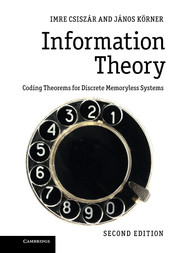Crossref Citations
This Book has been
cited by the following publications. This list is generated based on data provided by Crossref.
Allahverdyan, A. E.
and
Saakian, D. B.
1998.
Strengthened Lindblad inequality: Applications in nonequilibrium thermodynamics and quantum information theory.
Physical Review E,
Vol. 58,
Issue. 1,
p.
1148.
Greco, G.
1998.
Capacities of graphs and 2-matchings.
Discrete Mathematics,
Vol. 186,
Issue. 1-3,
p.
135.
Jozsa, Richard
Horodecki, Michał
Horodecki, Paweł
and
Horodecki, Ryszard
1998.
Universal Quantum Information Compression.
Physical Review Letters,
Vol. 81,
Issue. 8,
p.
1714.
Tyagi, Himanshu
Narayan, Prakash
and
Gupta, Piyush
2011.
When Is a Function Securely Computable?.
IEEE Transactions on Information Theory,
Vol. 57,
Issue. 10,
p.
6337.
Kalogridis, George
and
Denic, Stojan Z.
2011.
Data Mining and Privacy of Personal Behaviour Types in Smart Grid.
p.
636.
Dorlas, Tony
and
Morgan, Ciara
2011.
Invalidity of a strong capacity for a quantum channel with memory.
Physical Review A,
Vol. 84,
Issue. 4,
Kieffer, John
2011.
A Catalog of Self-Affine Hierarchical Entropy Functions.
Algorithms,
Vol. 4,
Issue. 4,
p.
307.
Chung, Hye Won
Guha, Saikat
and
Zheng, Lizhong
2011.
On capacity of optical channels with coherent detection.
p.
879.
Csiszár, Imre
2011.
Information Theoretic Security.
Vol. 6673,
Issue. ,
p.
73.
Hye Won Chung
Guha, Saikat
and
Zheng, Lizhong
2011.
On capacity of optical channels with coherent detection.
p.
284.
Wang, Da
Chandar, Venkat
Chung, Sae-Young
and
Wornell, Gregory W.
2012.
On reliability functions for single-message unequal error protection.
p.
2934.
Akyol, Emrah
Viswanatha, Kumar
and
Rose, Kenneth
2012.
Combinatorial message sharing and random binning for multiple description coding.
p.
1371.
Campo, Adria Tauste
Vazquez-Vilar, Gonzalo
Guillen i Fabregas, Albert
Koch, Tobias
and
Martinez, Alfonso
2012.
Achieving Csiszár's source-channel coding exponent with product distributions.
p.
1548.
Barni, Mauro
and
Tondi, Benedetta
2012.
Optimum forensic and counter-forensic strategies for source identification with training data.
p.
199.
Matthews, W.
2012.
A Linear Program for the Finite Block Length Converse of Polyanskiy–Poor–Verdú Via Nonsignaling Codes.
IEEE Transactions on Information Theory,
Vol. 58,
Issue. 12,
p.
7036.
Rezaee, Arman
Calmon, Flavio du Pin
Zeger, Linda M.
and
Medard, Muriel
2012.
Speeding Multicast by Acknowledgment Reduction Technique (SMART) Enabling Robustness of QoE to the Number of Users.
IEEE Journal on Selected Areas in Communications,
Vol. 30,
Issue. 7,
p.
1270.
Vellambi, Badri N.
2012.
The effect of zero-rate encoders in the multi-terminal source coding problem.
p.
756.
Akyol, Emrah
Viswanatha, Kumar
and
Rose, Kenneth
2012.
On random binning versus conditional codebook methods in multiple descriptions coding.
p.
312.
Tyagi, Himanshu
2012.
Distributed computing with privacy.
p.
1157.
Scarlett, Jonathan
Martinez, Alfonso
and
Fabregas, Albert Guillen i
2012.
Ensemble-tight error exponents for mismatched decoders.
p.
1951.



